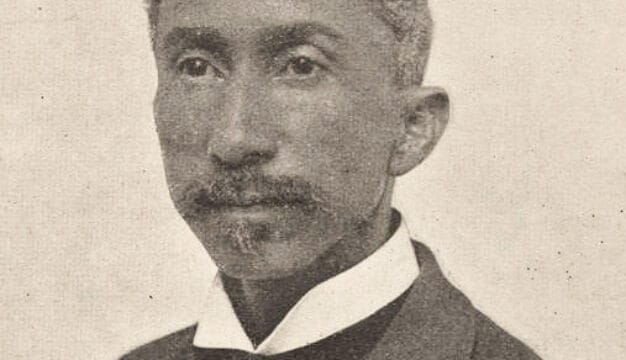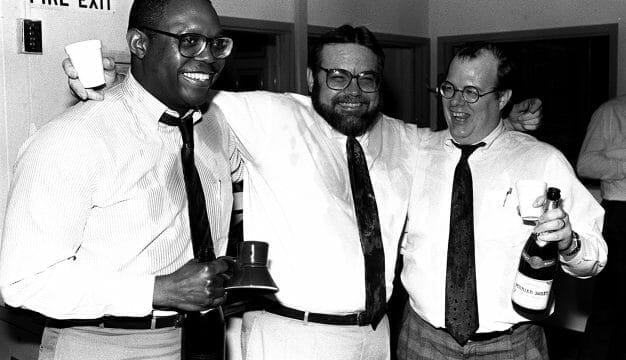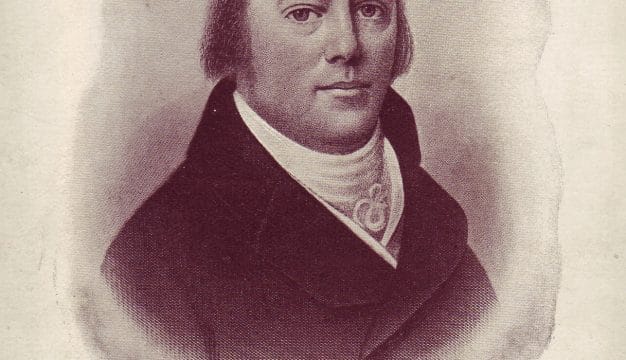Jeff Sessions
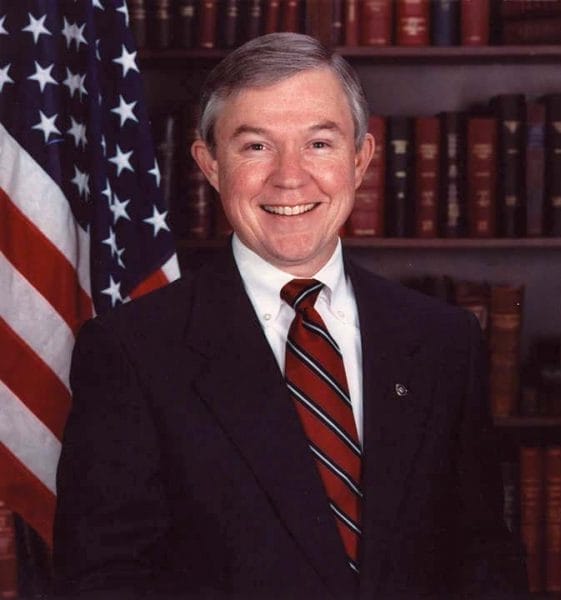 Jeff Sessions
Jefferson “Jeff” Beauregard Sessions III (1946- ) is a politician and lawyer who served as the 84th Attorney General of the United States, from January 2017 until November 2018. Sessions also represented Alabama in the U.S. Senate from 1997 to 2017 and is the former U.S. Attorney for the Southern District of Alabama and former Alabama attorney general. As a prosecutor and elected official, Sessions championed conservative social and economic issues, having notably hardline views on the treatment of undocumented immigrants and supporting hardline drug sentencing laws. His appointment to head the U.S. Department of Justice (DOJ) led to a contentious relationship with Pres. Donald Trump over the expanding investigation into Russian influence in the 2016 national election. Sessions was pressured into resigning from the post on November 7, 2018, the day after the 2018 midterm elections.
Jeff Sessions
Jefferson “Jeff” Beauregard Sessions III (1946- ) is a politician and lawyer who served as the 84th Attorney General of the United States, from January 2017 until November 2018. Sessions also represented Alabama in the U.S. Senate from 1997 to 2017 and is the former U.S. Attorney for the Southern District of Alabama and former Alabama attorney general. As a prosecutor and elected official, Sessions championed conservative social and economic issues, having notably hardline views on the treatment of undocumented immigrants and supporting hardline drug sentencing laws. His appointment to head the U.S. Department of Justice (DOJ) led to a contentious relationship with Pres. Donald Trump over the expanding investigation into Russian influence in the 2016 national election. Sessions was pressured into resigning from the post on November 7, 2018, the day after the 2018 midterm elections.
Sessions was born in Selma, Dallas County, on December 24, 1946, to Jefferson Beauregard Sessions Jr. and Abigail “Abbie” Powe Sessions. He grew up in the unincorporated community of Hybart, Monroe County, where his father, a World War II veteran and lifelong Democrat, owned a country store. Educated in public schools, Sessions attended Camden High School, where he played linebacker on the football team and was elected senior class president. After graduating, Sessions entered Huntingdon College in Montgomery, Montgomery County, where he was active in the Young Republicans and was voted president of the school’s Student Government Association. He graduated in 1969 and, shortly after, married Gadsden native Mary Blackshear, with whom he has three children.
Sessions attended the University of Alabama Law School and received a degree in 1973. After admission to the Alabama State Bar, Sessions became a practicing attorney in Russellville, Franklin County. From 1973 to 1986, Sessions served in the U.S. Army Reserve, attaining the rank of captain. In 1975, Pres. Gerald Ford named Sessions the Assistant U.S. Attorney for the Southern District of Alabama in Mobile, Mobile County, a post he held for two years. Pres. Ronald Reagan appointed Sessions as U.S Attorney for the Southern District in 1981.
Notably, Sessions oversaw a joint federal and state investigation into voter fraud in 1984 that focused on the Black Belt counties of Greene, Lowndes, Perry, Sumter, and Wilcox. The inquiry centered on the use of absentee ballots by African American voters. The effort became a cause célèbre for civil rights groups, who alleged the investigation was intended to reverse black electoral victories in these areas. Eight people were indicted on varying charges of conspiracy, mail fraud, and voter fraud in two cases that were later dubbed the “Marion Three” and the “Green County Five.” All of the defendants but one were eventually acquitted by majority white juries. The one conviction was later overturned on the grounds African Americans were eliminated from the jury pool by prosecutors.
The voter fraud investigation would haunt Sessions two years later, when he was recommended for a U.S. District Court judgeship by U.S. senator Jeremiah Denton Jr., a fellow Alabamian, and nominated for the post by Pres. Ronald Reagan. The Senate Judiciary Committee, led by Republican Arlen Specter of Pennsylvania, killed the nomination, citing Sessions’ “gross insensitivity” to racial issues, despite Sessions’ denials of the allegations of racism and discrimination. Also damaging was testimony by DOJ witnesses who claimed Sessions had made racially insensitive comments while a prosecutor.
In 1994, Sessions launched his first campaign for public office, vying for Alabama Attorney General against Democrat Jimmy Evans. His landslide victory in the race was part of a wave of Republican victories that turned the state from Democrat to Republican control. During his time in office, Sessions oversaw a second voter fraud probe involving the use of absentee ballots by African American voters in the state’s Black Belt. The joint investigation with the DOJ again prompted an outcry from civil rights groups, who claimed the inquiry was intended to discourage black voters from casting ballots. The investigations resulted in two convictions and seven plea agreements.
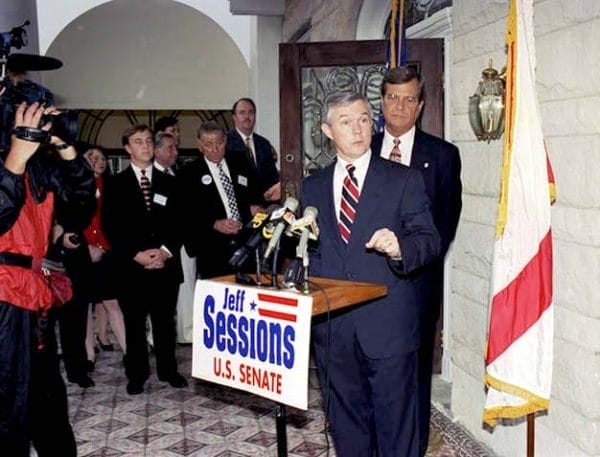 Sessions Campaign Stop
When U.S. senator Howell Heflin stepped down citing health concerns in 1996, Sessions ran for the office. The race between him and State Senator Roger Bedford was notable for mudslinging and accusations on both sides. Sessions won the election 52 percent to 45 percent, and Alabama was represented by two Republican senators for the first time since Reconstruction. (Richard Shelby was elected as a Democrat in 1992 but switched parties two years later). During Sessions’ first year in Congress, he notably voted in favor of both articles of impeachment against Pres. Bill Clinton, although the vote ended in favor of Clinton. Sessions easily won reelections in 2002, 2008, and 2014.
Sessions Campaign Stop
When U.S. senator Howell Heflin stepped down citing health concerns in 1996, Sessions ran for the office. The race between him and State Senator Roger Bedford was notable for mudslinging and accusations on both sides. Sessions won the election 52 percent to 45 percent, and Alabama was represented by two Republican senators for the first time since Reconstruction. (Richard Shelby was elected as a Democrat in 1992 but switched parties two years later). During Sessions’ first year in Congress, he notably voted in favor of both articles of impeachment against Pres. Bill Clinton, although the vote ended in favor of Clinton. Sessions easily won reelections in 2002, 2008, and 2014.
As a senator, Sessions consistently supported conservative economic policies, such as a balanced budget and tax reductions under Clinton. He stood behind Pres. George W. Bush’s Global War on Terror and tax cuts in 2001 and 2003. He opposed the Emergency Economic Stabilization Act of 2008 and the American Recovery and Reinvestment Act in 2009, legislative efforts to allay the economic downturn that occurred during the Great Recession at the end of the Bush presidency. During the presidency of Barack Obama, Sessions voted against the Lilly Ledbetter Fair Pay Act of 2009, named for the Alabama resident who brought suit against Goodyear Tire for pay discrimination. Sessions also opposed the Patient Protection and Affordable Care Act (popularly known as Obamacare), which became law in 2010.
Legislation introduced by Sessions that became law includes the first U.S. federal law intended to deter the sexual assault of prisoners as well as laws that placed military contractors under U.S. law and exempted church health plans from state licensing and insolvency requirements. He also introduced legislation to make more medications legally available to veterinarians and animal owners for the treatment of minor animal species and uncommon diseases in the major animal species.
Sessions also championed efforts to eliminate federal earmarks-line items directed to special projects added by legislators into discretionary spending bills. In 2010, Sessions co-sponsored an unsuccessful five-year earmark moratorium and, a year later, backed a successful effort to impose a temporary two-year ban on earmarks that remains in place. Sessions’s stance on earmarks was opposed by Senator Shelby.
Sessions served on the Judiciary Committee, the Armed Services Committee, and the Environment and Public Works Committee during his tenure in the Senate and in 2009 became the Judiciary Committee’s top-ranking Republican when Sen. Arlen Specter changed parties. He was elected to a fourth term in 2014 after running unopposed and receiving more than 97 percent of votes cast in the state.
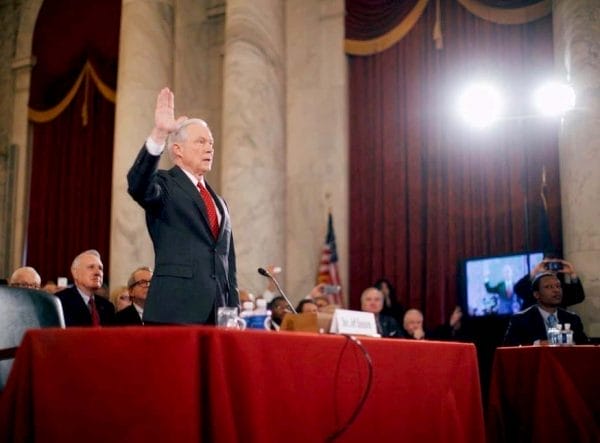 Jeff Sessions Confirmation Hearing
In 2015, Sessions was an early high-profile Senate supporter of outsider candidate and New York businessman Donald Trump in his bid for president of the United States. Sessions appeared with Trump at a rally in Mobile in August 2015 and formally endorsed the candidate six months later at a rally in Madison, Madison County. He was the first sitting U.S. senator to do so. Sessions went onto serve the campaign as a policy advisor on issues such as immigration.
Jeff Sessions Confirmation Hearing
In 2015, Sessions was an early high-profile Senate supporter of outsider candidate and New York businessman Donald Trump in his bid for president of the United States. Sessions appeared with Trump at a rally in Mobile in August 2015 and formally endorsed the candidate six months later at a rally in Madison, Madison County. He was the first sitting U.S. senator to do so. Sessions went onto serve the campaign as a policy advisor on issues such as immigration.
Sessions spoke on Trump’s behalf at the Republican National Convention, which selected Trump as the party’s candidate for president. Following Trump’s electoral victory, Sessions served as the vice-chairman on the presidential transition team. Trump nominated Sessions for U.S. Attorney General shortly after his inauguration in January 2017. Sessions was confirmed by the Senate with a 52-47 split along party lines following a contentious confirmation process that revisited his voter-fraud cases in Alabama. Alabama attorney general Luther Strange was appointed to Sessions’ Senate seat by Gov. Robert Bentley. But Strange was unsuccessful in his bid to win the seat outright in the December 2017 special election. The seat went to U.S. attorney Doug Jones, a Democrat, in a contentious and close race with former state Supreme Court chief justice Roy Moore, who had defeated Strange in the Republican primary in the wake of Bentley’s forced resignation as governor.
Shortly after his confirmation, Sessions became embroiled in the FBI’s investigation into Russian interference with the 2016 election. Sessions recused himself from the investigation after it was revealed he had met twice with the Russian ambassador during the presidential campaign, a fact he did not disclose to the Senate Judiciary Committee during his confirmation hearings. Sessions was criticized by Democrats and many in the media for repeatedly saying he had no recollection of meeting with Russians but admitted in a November 2017 hearing that he did. Sessions’ recusal from the investigation and failure to investigate Hillary Clinton had strained his relationship with Pres. Trump. In March 2018, Sessions fired FBI deputy director Andrew McCabe, who had been a target of the president for his role in the Russia investigation and was accused of improperly releasing material to the media related to the agency’s handling of Hillary Clinton.
Sessions has been known for his opposition to immigration, particularly relating to individuals without legal documentation. He opposed amnesty for illegal immigrants and backed efforts to slow the numbers of legal immigrants entering the country and was a supporter of Alabama’s 2011 anti-immigration law HB 56. Session vocally opposed a 2013 comprehensive immigration reform bill that passed the Senate but died in the 113th Congress because the House of Representatives did not act on it. Under his watch, DOJ supported measures that enhance enforcement of immigration laws and the reversal of amnesty measures initiated by the administration of Pres. Obama. The agency was quick to enforce an executive order suspending the issuance of visas to residents of seven majority-Muslim countries and the U.S. refugee program. This effort was subsequently suspended while opponents fought the measure in court. Additionally, the department moved to strip funding for “sanctuary cities” that declined to communicate with federal officials about undocumented immigrants.
Sessions announced in September 2017 the Trump administration’s decision to phase out the Deferred Action for Childhood Arrivals (DACA) program, which provided protection to 800,000 undocumented immigrants in the United States. He had argued that the program allowed illegal immigrants to take jobs that would otherwise be filled by Americans and contributed to a surge of minors attempting to cross the country’s southern borders. In April 2018, he announced a “zero-tolerance policy” on border crossings that notably led to children being separated from their parents when they were apprehended for illegally entering the United States. He also took strong positions against legal marijuana and encouraged the death penalty for certain drug-trafficking offenses and longer sentences for convicted criminals. In November 2019, Sessions announced that he was seeking his old Senate seat held by Democrat Doug Jones. In the March 2020 primary, Session came in second to former Auburn football coach Tommy Tuberville in a crowded and contentious race forcing a runoff election postponed by the coronavirus. In July, Sessions lost the runoff by a large margin.
Sessions has been Sunday school teacher at the Ashland Place United Methodist Church in Mobile and has served on the Board of Trustees of Huntingdon College and the Board of Overseers of Samford University. He is a member of the Board of Advisors of the Close-Up Foundation, a non-partisan nonprofit that promotes government engagement among young people.
